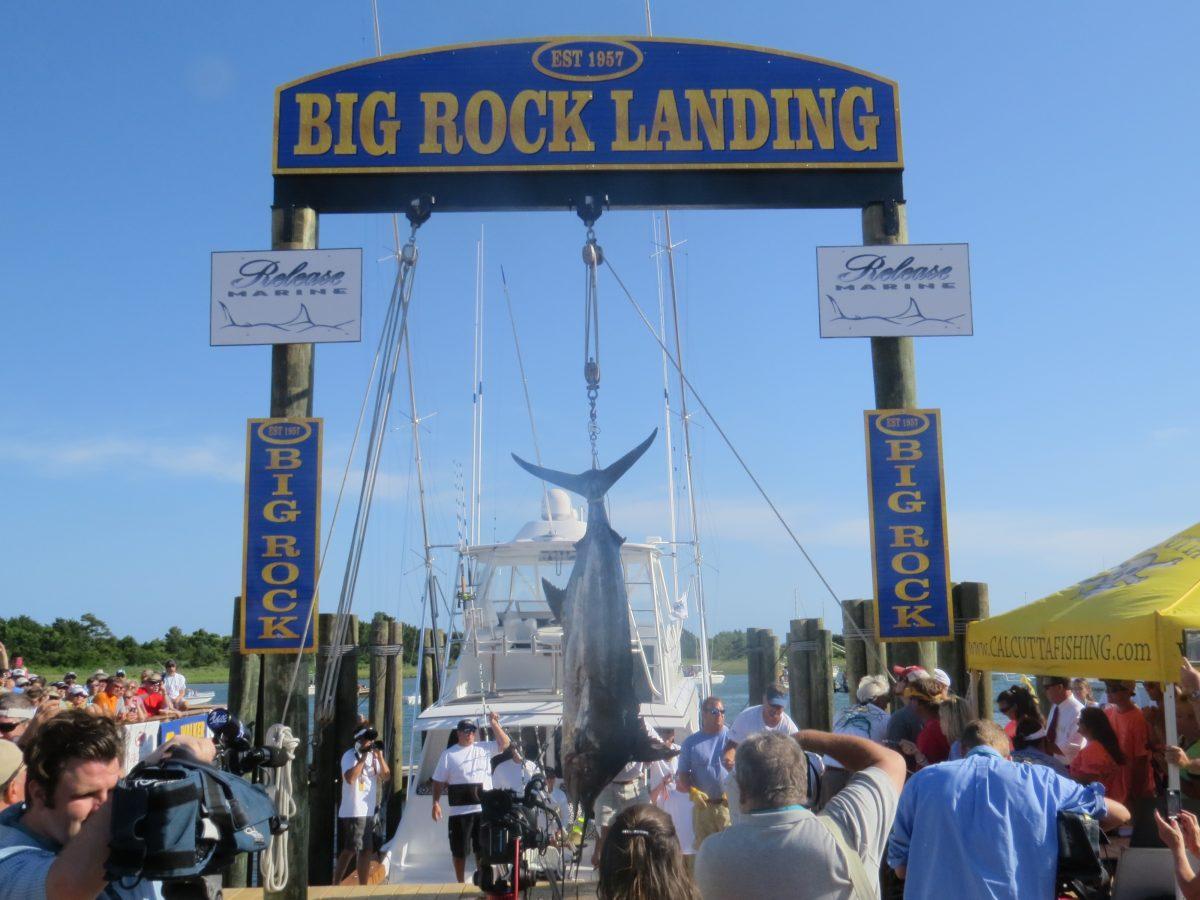 Fisherman weigh a blue marlin caught in the Big Rock fishing tournament last summer in Morehead City, NC. The Big Rock is just one of the fishing tournaments that turn their caught fish to CMAST to study feeding ecology, track migration habits and measure water toxins present in the bodies of the fish brought to the dock." />
Fisherman weigh a blue marlin caught in the Big Rock fishing tournament last summer in Morehead City, NC. The Big Rock is just one of the fishing tournaments that turn their caught fish to CMAST to study feeding ecology, track migration habits and measure water toxins present in the bodies of the fish brought to the dock." />
Photo by Gavin Stone
Fisherman weigh a blue marlin caught in the Big Rock fishing tournament last summer in Morehead City, NC. The Big Rock is just one of the fishing tournaments that turn their caught fish to CMAST to study feeding ecology, track migration habits and measure water toxins present in the bodies of the fish brought to the dock.
The spring 2016 semester will be the first time NC State has offered an opportunity to spend a semester studying marine sciences on the Carolina Coast to all students, regardless of year or major.
The Semester @ CMAST program allows students to spend a semester at the Center for Marine Sciences and Technology research facility to study a curriculum of marine sciences and provides hands-on work with research facilities based out of Morehead City.
“We’re able to take advantage of the resources in the area and offer students courses unavailable at NC State or to plug students into research opportunities and internships,” said David Eggleston, a marine ecology professor.
Spearheaded by Eggleston and William Winner, an environmental science professor, the program began because professors felt they had more to offer students.
“We have provided summer session courses for undergraduates for years, and what we found is that we just have so much more to offer with this program,” Eggleston said.
The facilities that work in cooperation with CMAST include the Duke Marine Lab, the National Oceanic and Atmospheric Administration Federal Lab and the North Carolina Division of Marine Fisheries, which are all located in the same vicinity of CMAST, making Morehead City a hub for some of the largest marine science projects on the East Coast.
The program requires a minimum of 15 credit hours and consists of classes such as Introduction to Oceanography and Biology of Marine Mammals with optional external learning experiences that range from internships, professional developmental activities and an undergraduate thesis.
While this program is open to all majors, it may seem like a loss of a semester to non-environmental science students. The professors took this into account when designing the course.
“There’s intentional design of the courses so students are able to meet degree requirements for majors across campus,” Winner said. There are also a variety of other classes offered by Carteret Community College, which shares a part in the CMAST building.
“Students who need another class in their sequence of calculus or English or biology can take a wide breadth of courses at Carteret Community College,” Eggleston said.
The program only accepts 25 applicants, the class size for the courses, and is taught by NC State scientists who will be team-teaching with local experts. The 25 applicants will live in the same hall, dine together and study together, making for an “NC State experience at the coast,” according to Katherine Winsett, professor of environmental science.
The professors will review each application on a case-by-case basis.
“The criteria for reviewing the student application will be discussed as we see them,” Winner said. “We’re looking to create a diversified student group in terms of gender, major, rank in class — we’re looking for a diverse pool of students.”
Tuition, fees and the student health plan will be the same price as that of living on campus, a savings that Winner and Eggleston managed to maintain for students. There is a $1,500 extra fee because of the difference between Duke Marine Lab and NC State’s dining and room costs.
Claire Pelletier, a sophomore studying environmental science and an applicant for the program, explained her fascination with the Semester @ CMAST.
“I want my career to somehow relate to marine sciences and I grew up near the coast, and so I’m looking forward to learning in that environment,” Pelletier said. “Hopefully this will help me figure out what I want to do in the future.”
The course will also expose students to marine law and policies regarding environmental sustainability, something that may interest many students involved in environmental sciences.
“As a society in general, we don’t really pay enough attention to some of the options we have with sustainability,” Pelletier said. “So I’m excited to learn more about marine law and fishery maintenance and stuff like that.”
Emily McGuirt, a freshman studying environmental science, is another applicant for the Semester @ CMAST program and is passionate about sustainability.
“I didn’t have many doubts going into this, and I really think that after I get some exposure to what the coast offers, I’ll start to get a better idea of what I want to do career-wise,” McGuirt said.
Already relatively familiar with research in the sciences, McGuirt hopes to put her skills to use in a practical experience at the coast.
“I’d be interested in interning at the aquatic museum and seeing what they do up close,” McGuirt said.
Eggleston hopes the Semester @ CMAST will be sustained for many years to come.
“We’d like to offer this indefinitely every spring semester and conceivably,” Eggleston said. “If there’s enough interest it’ll be something that will be available in the fall and spring semesters.”
The deadline for applying for the Semester @ CMAST program is Oct. 15. The application can be found at www.cmast.ncsu.edu.